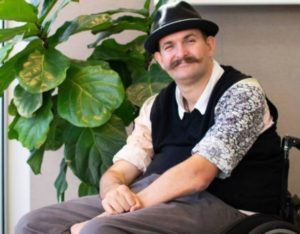Ben Aldridge – Busselton Mail
Professional Speaker, Advocate, Disability Awareness Facilitator
Australian Defence Force veteran and South West resident Ben Aldridge speaks about work after war.
ANZAC Day has come and gone. A day of parades, prayers, good old Australian pride. For those of us no longer serving, it was wonderful acknowledgement of our hard work and sacrifices.
It’s a great day. But for the rest of the year there are no parades, no prayers, barely any recognition and nowhere near enough support.
The Australian Defence Force does a wonderful job of creating highly capable, highly trained military personnel. When you enter the ADF, you do so knowing – and sometimes hoping – it will transform you.
You get broken down, reprogrammed and rebuilt to form part of well-functioning unit. They do a good job at that, and I don’t dispute that it needs to happen. What they don’t do a good job of is rebuilding us a second time when we exit. They don’t send us off as a person able to function successfully in civilian life.
I spent three years as a member of 2RAR, an Australian Infantry Battalion and was deployed to East Timor during 2006. My time there was entirely stressful and morally troubling, and I was in no way equipped for returning home. I developed post-traumatic stress disorder and the most constructive way I could think to deal with this was to drink heavily.
It’s hardly a revelation that veterans experience poorer mental health outcomes than the wider population – the 2018 Australian Institute of Health and Welfare report A profile of Australia’s veterans includes the statistics that 51 per cent of men who served in the ADF would meet the diagnosable criteria for a lifetime mental disorder.
A lifetime mental disorder. A lifetime of invisible disability that very, very few people will see or understand. It’s killing us. There is a good reason that there is a Royal Commission into Veteran Suicide holding hearings across the country right now.
(Apologies to all female veterans for the male-only statistics – the fact that you are fewer in numbers and have joined the ranks of those on active service relatively recently, means the statisticians don’t yet have enough data to measure your trauma. Sadly, I can’t imagine it will be any less than the men.)
Mental health aside, there is arthritis, back pain, knee pain and heart problems that can also make life harder for us. I can almost hear the weary acceptance that yes, of course our experiences will leave us with mental and physical health problems. It comes with the job.
But this is where we need your help. We need you, our civilians, to see our trauma and disability, but to then look past that and see everything we have to offer. We need you to help us find new roles, new teams and a new sense of purpose.
When I looked to re-enter the civilian workforce, I applied for dozens of entry level positions, and I couldn’t even get an interview. It turned out that I had fewer employment prospects than before I joined the infantry – employers treated my resume as if it had a gaping three-year hole in it.
One thing that isn’t well known about the Australian Military is that, because we are so small, everyone is cross-trained in everything. We are expected to be competent in every role within our unit so that we could take over another person’s role if needed. I trained in everything from communications to handling explosives among so much more.
From my perspective, if you’ve spent time in the ADF, you have the aptitude and experience to be a front-line manager. We just need employers to understand that.
I often wonder why employers don’t. Perhaps we scare people? Perhaps our disability and trauma are too much? I understand, it can be a lot.
My story sometimes is. Walking home drunk one night I fell over the edge of a cliff – I fell 10m and broke my neck, leaving me a quadriplegic.
I still consider this to be my lucky break. My accident gave me that opportunity to rebuild myself a second time, to unlearn what had been trained into me.
After going through rehabilitation, I found an employer willing to give me a chance. Forrest Personnel saw me for everything that I was and everything I could be, and even though I probably was not the best choice for a reception role, they hired me. I had a team again – they taught me, they nurtured me, they had my back. My skills were put to good use, and my confidence grew.
It made the difference – and today I’m proud not just to be the director of my own consultancy business but to also sit on the Board of Forrest Personnel and other organisations.
So in the days after ANZAC Day, I would ask everyone to think about how they might support us for the rest of the year. I would challenge employers in particular to look more closely at the CVs of veterans that might come across their desk.
Yes, we might have a couple of dodgy knees, and yes, we probably do need some support with our mental health. But we’re far from broken. We are highly trained, highly motivated individuals and our expertise and experience can only benefit you, your team, and your organisation.
We just need that chance.
